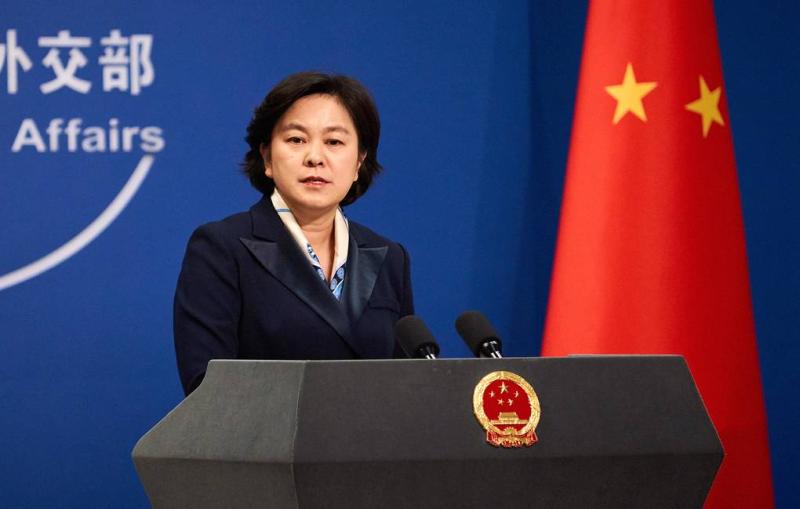
© Artyom Ivanov/TASS
China praises statements by Russian President Vladimir Putin that US House Speaker Nancy Pelosi’s visit to Taiwan has been a deliberate provocative move. This came from Chinese Foreign Ministry spokesman Wang Wenbin at a briefing on August 17.
China highly appreciates Russia’s stance, the diplomat said when asked to comment on president Putin’s words. According to him, Pelosi’s visit has made over 170 countries reaffirm their commitment to the "One China" principle and support China's efforts to protect sovereignty and territorial integrity.
Just a reminder: this week’s address by President Putin to those attending the 10th Moscow Conference on International Security featured a statement that Pelosi's visit to Taiwan was “not just a voyage by an irresponsible politician, but part of the purpose-oriented and deliberate US strategy designed to destabilize the situation and sow chaos in the region and the world.” According to the Russian leader, the United States has “recently made another deliberate attempt to fuel the flames and stir up trouble in the Asia-Pacific.”
China regarded Vladimir Putin's words as a testament to the parties’ bilateral relations. "President Putin's statement reflects high-level strategic cooperation between China and Russia. Also, it is a manifestation of the two countries' consistent and firm mutual support on issues that concern each other's key interests," Wang Wenbin said.
Indeed, Pelosi's visit to Taiwan on August 2 to 3 aroused much controversy and strained the already troubled relations between China and the United States to the breaking point. Having abstained from a drastic response, Beijing imposed personal sanctions against Pelosi and her family, and arranged a virtual economic and military blockade of Taiwan. China has so far preferred not to invade the island directly but has not shut the door on such a possibility if the situation around Taiwan, which Beijing considers part of its territory, turns spikiest. At the same time, the Chinese Foreign Ministry said all the negative consequences of Pelosi's visit are yet to come, with Washington and Taipei to bear the blame.
Notably, due to Pelosi's trip, Beijing suspended dialogue with Washington on several key areas of bilateral cooperation, including justice, the fight against drugs, international crime and illegal migration. Negotiations on climate change have been frozen; maritime security meetings have been canceled. Besides, the PRC has called off an engagement between the two countries’ defense officials.
Moscow’s response to Pelosi's visit to Taipei was not long in coming, with Russian president’s press secretary Dmitry Peskov expressing solidarity with China regarding its Taiwan stance back on August 3. He said the United States was provoking a conflict with China by deliberately stirring up tensions in the Taiwan Strait. A similar viewpoint was expressed by Foreign Ministry spokeswoman Maria Zakharova, who said Russia considered Pelosi's visit to Taiwan as another provocative action by the US administration wishing to exert additional pressure on Beijing. "As an Asia-Pacific state, Russia hopes that the Taiwan problem will be resolved without prejudice to peace and stability in the region," the diplomat said.
Last Tuesday, President Putin reiterated the immutability of Moscow's attitude towards Taiwan, reaffirming respect for the "One China" principle and support for China's efforts to protect state sovereignty and territorial integrity. As we can see, this approach has resonated with Beijing.
In turn, the apparent setback in US-Chinese relations following trips to Taiwan by Nancy Pelosi and a number of US congressmen, makes us contemplate the consequences for Russia. Some experts believe all of this will finally help Beijing make a pivot to Moscow.
In this regard, China's support is vital to Russia, with its special military operation underway. Yet Moscow should not expect military assistance from Beijing in combating Ukrainian neo-Nazis. Russia does not need it by and large, since its current military potential allows coping with Bandera followers without China's engagement.
There is another important thing here. The crisis around Taipei has clearly shown the Chinese leadership how similar the events in Ukraine and Taiwan are – in both cases the United States acts as conflict instigator, willing to destroy Russia and then China.
It is quite obvious that Pelosi's visit to the "island of discord" has actually turned the Ukrainian and Taiwanese crises into communicating vessels. Small wonder that Russian Foreign Minister Sergey Lavrov recently stated that Washington's stance on Taiwan "reflects the same line that we are discussing as regards the Ukrainian situation." It turns out that Nancy Pelosi, being one of Russia and China’s main enemies in the United States, has unwittingly played along with both countries. So, Moscow and Beijing are on the same journey in the stormy waters of the world ocean.
For this reason, nothing prevents Russia and China from entering a new phase of relations and proceed with strengthening their comprehensive, equal, trust-based partnership and strategic interaction. Under the current circumstances, the two simply need to stick together and resist the aggressive course of Washington, its NATO allies and other blocs. By doing so, Russia will fight off enemies from the West, and China – those in the Asia-Pacific.









